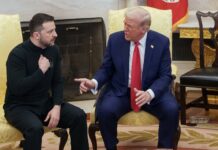One thing I have consistently heard from many Africans, without fail, is that Africa is often portrayed extremely negatively by “the media.” When these discussions are often had, it is typically referring to Western media, especially. Now, I would regularly agree with the assertion, however a bigger picture I think is always missing within these discussions is the one viable solution, African Media.
In another article titled … I discussed the recent visit of the American Twitch Streamer Kai Cenat’s visit to Nigeria and his visit to the Makoko slum in Lagos. This trip caused quite a bit of debate over why the American streamer would make the trip all the way to Nigeria so he could broadcast the poor living conditions present at the Makoko slum. In the article, I argued the streamer is well within his right to broadcast what he wishes to his audience, it is not his role to run public relations for Nigeria or the African continent in general.
At the same time, I understand that this negative portrayal of Africa often displayed in the media can have detrimental effects on people’s perception of the continent. There are many who may view this content and leave with the impression that massive levels of poverty are all that is present on the continent. On the internet, you can find various testimonials of Africans who move abroad and are forced to explain to outsiders that there are indeed millions of Africans who have access to things like electricity and the internet.
So what is the solution? How can we fix the issue of the overwhelmingly narrative that is shared with the outside world about Africa? Here is the answer…
Empowering African Media
If we are going to improve on the narrative that is shared about Africa, there is only one thing we can do about it, is by putting out a better narrative. Yes, there is a lot of poverty and violence present within many African countries. These are stories that need to be told. However, there needs to be a level of nuance in the coverage, and I don’t think there would be any group better at exhibiting that nuance like African media.
There are examples of African media doing just that. I am aware that there are many dedicated African journalists who are just as invested in passionately telling African stories, however they can often feel like they are few and far between. I believe that is because there is due to lack of support for African media content, therefore it is imperative for us to show greater support towards good African journalism. Support can come in many ways: financial contributions, subscriptions, word-of-mouth recommendations, sometimes even simply by consistently consuming content.
Safeguarding Voices
The media industry is an inherently vulnerable industry, facing pressures from advertising, intense competition for audience attention, and consumer reluctance to pay for content, among other challenges.
One of the biggest obstacles faced by journalists are threats to their well beings as a result of their profession. Across the continent there have been incidents of journalists facing threats, being harassed, jailed, and even losing their lives due to their reporting.
It is worth emphasising that there are a few African countries that do rank highly on press freedom indexes, however that is unfortunately not the case all over the continent
Journalists play an important role in safeguarding democracy, holding the powerful accountable, and keeping the public informed. The importance of journalists, in combating government corruption and fostering political engagement, cannot be overstated. Therefore, it is vital that they are given the freedom to perform their duties without fear of reprisal or censorship. Preserving the journalism industry across the African continent is not just a matter of upholding press freedom; it is a commitment to the principles of transparency, accountability, and democracy.











